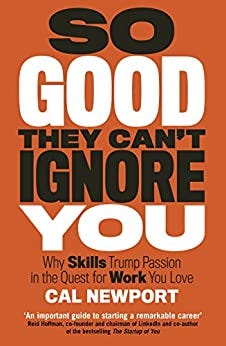Welcome to Citizen Scholar! Since launching three months ago we’re reaching hundreds of people a week, so we thank you for your support. If you enjoy our writing on civic virtue and individual excellence, we humbly ask you to share Citizen Scholar with your family members and friends who may enjoy it. The contents of the audio and text formats are identical and meant to accommodate your preferences. Please let us know if you have any feedback - we’re always looking for ways to improve!
Introduction
Why do some people end up loving what they do, while so many others fail at this goal?
How do people end up loving what they do?
In 2010, MIT computer science post-doc Cal Newport became obsessed with these questions. He was looking for a new job, likely as a professor, but wanted to make sure he was pursuing the right path. These questions are also relevant to many of us trying to figure out what to do with our lives or second-guessing what we’ve already chosen.
Newport’s methodology combined observations he’d already made with information derived from interviews with people who had pursued various paths. Interviewees ranged from scientists and venture capitalists to environmental writer-activists and Zen Buddhist monks. Newport came to the firm conviction that the career advice to “follow your passion” is flawed. He also developed an alternative framework for achieving a satisfying career, summarized in four rules.
The Four Rules
Rule 1: Don’t Follow Your Passion
Rule 2: Be So Good They Can’t Ignore You (Or, the Importance of Skill)
Rule 3: Turn Down a Promotion (Or, the Importance of Control)
Rule 4: Think Small, Act Big (Or, the Importance of Mission)
It’s rare to find true passion in people, and even rarer to find it for commercial activities or paired with enough talent to earn a living with [professional athletes, Hollywood career, etc.]. Most people run the risk of trying to find work in something they and many others have a passion for, which may not be financially viable. We’re all familiar with this problem. However, not only can the lack of money wear down one’s enthusiasm over time, but working on one’s existing passions may not bring the happiness expected at the journey’s start. Newport includes a memorable example of Thomas, who left his desk job to become a Zen Buddhist monk. After months of refining his practice to a high level, he realized that it didn’t make him happy and likely never would. Years later, he was back in knowledge work and happier than ever.
Newport advises against the selection of a path based on a pre-determined passion. He asserts that passion takes time to develop from trying and from doing, and that it is a side effect of mastery. Drawing on the old framework Self-Determination Theory (SDT), he starts with its principle that motivation requires the fulfillment of three basic psychological needs:
Autonomy: the feeling that you have control over your day, and that your actions are important
Competence: the feeling that you are good at what you do
Relatedness: the feeling of connection to other people
This idea forms the backbone of Rules #2-4. Newport builds his alternative recommended framework as a roadmap to achieving these three elements in a career or vocation. The “craftsman” approach requires a focus on increasing the value one can create rather than the value one can extract from a career by working on a pre-existing passion. A monomaniacal focus on putting in the time, effort and discipline required to achieve a high level of competence builds “career capital”.
The credibility and desirability this capital affords allows you to “reinvest” it by demanding more autonomy: working how, when, with whom and on what you want more of the time. If done right, career capital can also be invested in to serving a mission with and for people that you can derive meaning from. A cause you’re able to serve because of your skills or career capital might unwittingly develop into a passion. Newport gives the example of people whose dedication to scientific research unlocked the ability to help people with certain diseases, which became a passion they didn’t have at the start of their journey. He fleshes out this entire strategy with a number of tactics that make the book very much worth the read.
Obvious in Hindsight
Many of Newport’s ideas seem self-evident until we reflect on how low their penetration is amongst younger people in today’s developed countries. The popular imagination amongst high school and college students typically involves a dichotomy between cool jobs where people follow their passion at higher risk and safe jobs where people “sell out”
In our view, Newport’s framework offers an attractive “third way”. It ought to be required reading for high school students before they go on to college or other post-secondary school pursuits. So Good They Can’t Ignore You would help these students think more systematically about where and how to apply themselves before being forced to select an undergraduate major or a trade. Those who read this book before they sink costs into a certain path, may ultimately find more honest and compassionate advice than what many people in comfortable positions of authority are willing to give them.
For those of us who are a bit further down the road, So Good They Can’t Ignore You is a great companion to a book we covered earlier this year, Atomic Habits. As we look toward 2022, the wisdom gleaned from these books offers a systematic and compelling approach to constructing lives we can be proud of. We hope Citizen Scholar can be a helpful companion on this journey with you in 2022.
All the best,
The Citizen Scholar Team











